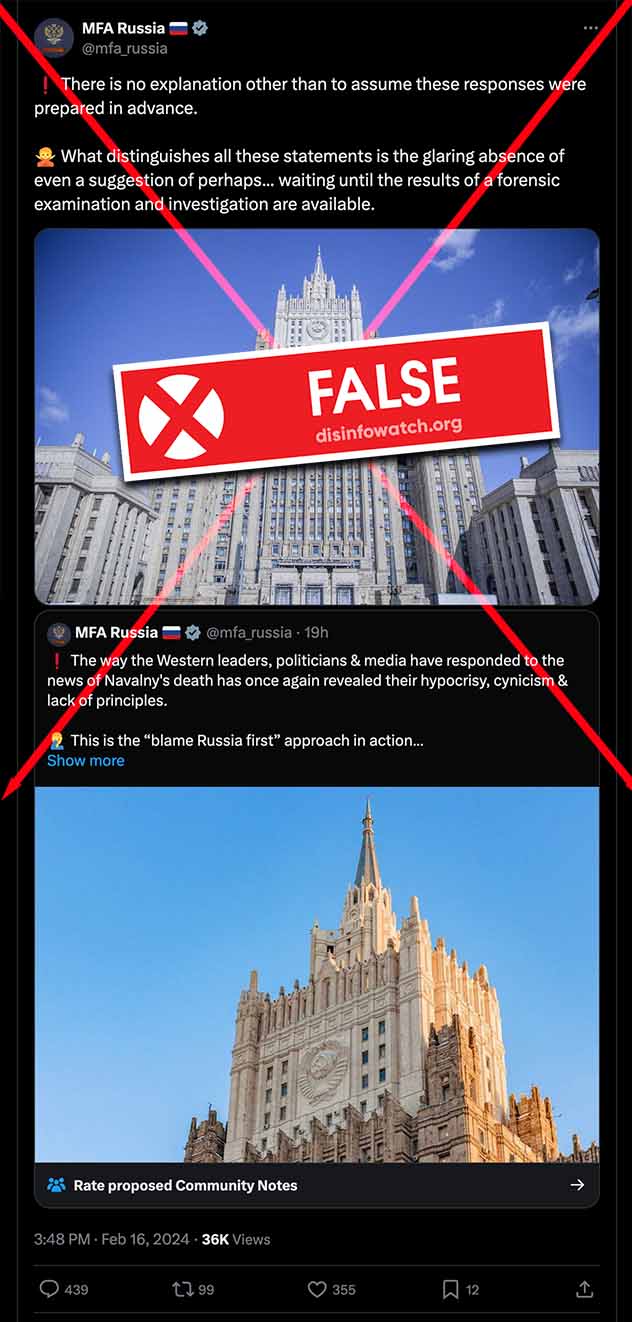
The Claims:
The Russian Ministry of Foreign Affairs has falsely claimed that Western governments conspired and colluded to coordinate responses to the killing of Russian opposition leader and anti-corruption activist Alexey Navalny in advance and has also introduced false equivalency narratives (whataboutism) to deflect attention away from the Kremlin’s responsibility for the killing of Navalny and its ongoing violent repression of the Russian people.
Narrative Context:
Discrediting, intimidating and silencing of critics is a hallmark of the Putin regime. The impact of Alexey Navalny’s anti-corruption investigations and his popularity among Russians was a threat to Putin and the kleptocrats that support him, making Navalny a target of government information operations, intimidation and repression. According to OSINT organization, Bellingcat, Navalny was poisoned by the FSB in August 2020. When he returned to Russian in January 2021, he was arrested and eventually ordered to serve a cumulative 30 year sentence. Navalny clearly posed a threat to the Kremlin even behind bars.
Given the mass international condemnation of the killing of Alexey Navalny Kremlin will seek to deflect attention away from Navalny’s legacy of fighting corruption and the Kremlin’s efforts to repress and silence him. It does so by accusing Western governments of colluding to accuse the Kremlin of killing Navalny – presenting itself and Vladimir Putin – as the victims.
The Kremlin is also engaging in false equivalency or whataboutism, to further deflect attention and blame. According to the European External Action Service’s EUvsDisinfo website:
“Whataboutism” is a rhetorical trick central to pro-Kremlin propaganda. President Putin avoids answering the important question by diverting attention to events outside Russia. The trick corresponds to the third of the four D’s in described in Ben Nimmo’s 4D approach – dismiss, distort, distract and dismay (see also our new video about the four D’s). The tactics of distracting attention also makes “whataboutism” closely related to another pro-Kremlin classic, namely the “Russophobia” claim.
The Facts:
There is no evidence of any collusion by Western governments to prepare any statements about the killing of Alexey Navalny in advance of his killing. Such claims could be introduced to prepare the information space for conspiracies about the nature of Navalny’s death, as have already been injected into social media.
The Kremlin’s equating of an American pro-Kremlin blogger, who died in a Ukrainian prison, with Alexey Navalny is a classic form of “whataboutism”. Gonzalo Lira was in Ukrainian custody not for criticizing Volodymyr Zelenskyi, but for violating Article 436-2 of Ukraine’s Criminal Code. Kremlin aligned websites claimed that Lira was being tortured without producing any evidence of it. According to a report by the Daily Beast, “Lira got his start with misogynistic dating advice shared on YouTube, where he billed himself as a relationship expert, but he suddenly pivoted after Russia launched its full-scale invasion of Ukraine in February 2022, blasting out Kremlin-friendly conspiracy theories and claiming to have foreign policy expertise since he was living in Ukraine.”


